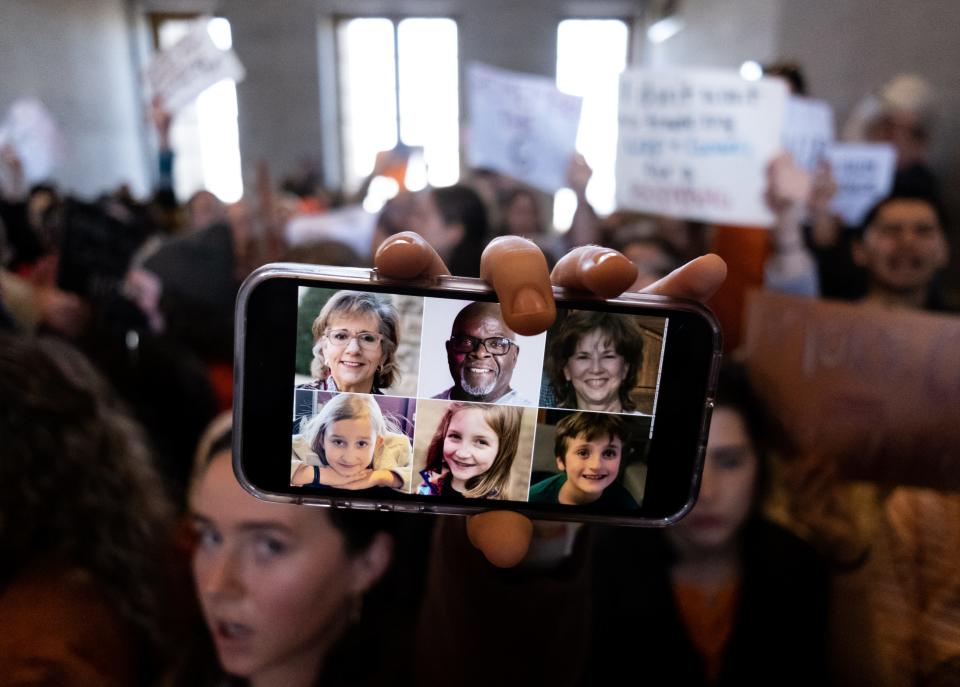There’s room for a third act in Tennessee’s tale of trauma | Opinion
There are those critical events that claim a permanent place in our collective memories. The shooting at Nashville’s Covenant School will be one of those, yet another reminder that evil actions have horrible consequences.
Ousting Democratic legislators backfired
The waves quickly rippled out beyond that day’s horror to another trauma to our politics and governing when two Democratic lawmakers in the Tennessee General Assembly were ousted for violations of House rules. In yet another reminder that actions in the governmental arena can have unintended consequences, Reps. Justin Jones’ and Justin Pearson’s voices were amplified rather than diminished. They will be coming back. Those killed at school will not.
The aftermath has left Tennessee battered and bruised, socially and politically. There’s no quick exit from the trauma of these events. Over the years countless leaders have repeated President Kennedy’s exhortation – "What unites us is far greater than what divides us." That’s still true; maybe without the “far.”

The causes of mass shootings are many and complex. The search for solutions inevitably ends up at the intersection of guns and mental illness. There’s common ground here for a redemptive third act that honors those who lost their lives and responds to those overwhelmed by the frustration of inaction.
Former governors Phil Bredesen, a Democrat, and Bill Haslam, a Republican, recently proposed a step forward. They correctly note the futility of spending energy in search of a Tennessee ban on assault weapons. The political reality is that there is zero chance of this happening and a virtual certainty that it would harden positions in any already polarized legislative body and beyond.
Red flag laws provide common ground
Rather they urge moving past the point of “hopeless disagreement” to a patch of what could be common ground: red flag laws. These laws identify people with mental health challenges and prevent them from owning firearms.
Hear more Tennessee voices: Get the weekly opinion newsletter for insightful and thought-provoking columns.
The time's right to claim this common ground. In the aftermath of the shootings at Parkland High School, the Florida legislature overcame its fundamental ideological divide long enough to pass such a law that later allowed police to remove firearms from a clearly troubled young man who had threatened gun violence in a Fort Lauderdale school.
Attitudes do change, usually slowly. But like everything else, the rate of change is increasing. This includes attitudes regarding firearms. The images of clearly troubled people using AR-15s to mow down kids in schools don’t quickly fade.
Not long ago assault weapons were illegal. They may be again at some point. While the overall legality of such weapons may not be on the table, the question of who can lawfully possess them is now open for discussion.
Tennessee Lt. Gov. Randy McNally has indicated a willingness to consider some sort of red flag legislation. Others may follow. These laws are not panaceas. Implementation is difficult and spotty. Evaluating their impact is difficult. But they can work to prevent catastrophic outcomes.
The Tennessee shooter was in counseling for emotional distress. Had a typical red flag law been in place, this individual could have been flagged and prevented from purchasing the weapons that had been legally stockpiled over a number of months.
The introduction of a red flag bill in the General Assembly will almost certainly produce heated discussion. Many will reference the Second Amendment, opining that a red flag law deprives people of a constitutional right. That will be countered by those who point to the definitive 2008 Supreme Court decision – the District of Columbia v. Heller – where Justice Antonin Scalia made it quite clear that rights to a firearm are subject to reasonable state regulation.
Smaller steps not only advance solutions. They also bring about a badly needed positive legislative muscle memory of cooperation over conflict. To be sure, any debate over red flag laws will doubtless be passionate. They may not pass, but there will be a debate where some might actually persuade others to rethink their positions.. There is clearly a well of support for a positive next step in this painful journey.
William Lyons is Director of Policy Partnerships for the Howard Baker Jr. Center for Public Policy and Professor Emeritus of Political Science at the University of Tennessee. He also served as Chief Policy Officer for Knoxville Mayors Bill Haslam, Daniel Brown and Madeline Rogero.
The views and opinions expressed are those of the author and do not necessarily reflect the official policy or position of the Howard Baker Jr. Center for Public Policy or the University of Tennessee.
This article originally appeared on Knoxville News Sentinel: There’s room for a third act in Tennessee’s tale of trauma | Opinion

